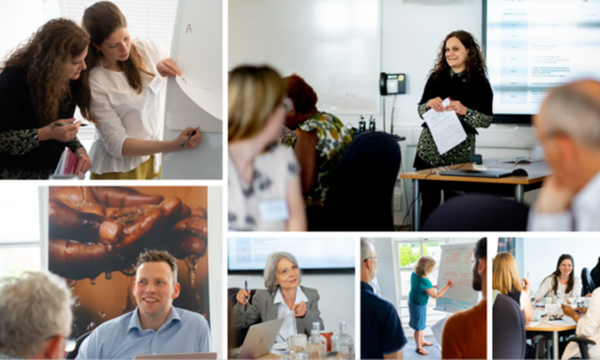
Heritage is at risk from climate change: a fact well known to those who gathered at the beautiful Henley Business School’s Greenlands campus from 19 to 20 May for a participatory workshop on “Climate Adaptation Options for Drought-Vulnerable Heritage Sites in East of England”.
Marking the implementation of the new partnership between the Walker Institute at the University of Reading and Historic England, the event convened multiple organisations with a shared commitment to protecting heritage and landscapes threatened by the changing climate: in particular, ancient wetlands.
Prof. Robert Van de Noort, Vice-Chancellor of the University of Reading, commented after joining part of the event: “At Reading we believe partnerships are crucial to help address key challenges, including the adverse effects of climate change on cultural heritage. I was delighted to join colleagues from the Walker Institute and experts from government and heritage organisations to initiate the important work of developing adaptation planning tools to protect our local heritage from climate change. Given my previous work on wetland archaeology, I was particularly glad to see sites such as Wicken Fen being at the forefront of research and policy interest.”
Human artefacts shedding light on ancient times, including Bronze Age life some 3,000 years ago, are at risk of increasing drought due to climate change as it impacts wetland heritage sites. Wetland sites in the East of England, such as Wicken Fen, Flag Fen basin and Beccles, have revealed internationally important wood, metal, stone and bone finds including weapons and jewellery. The sites have huge further potential for important archaeological discoveries. Yet, changes in water quality, quantity and soil geochemistry exacerbated by climate change threaten the waterlogged conditions that have protected these sites for millennia.
The workshop enabled the Walker Institute and partner Historic England to facilitate dialogue with a range of experts and practitioners from across the heritage and environment sectors. The goal is to develop climate adaptation planning tools and techniques to inform future sites management – preserving our historic environment and the insights to the past they can convey, helping people stay connected to place and community in spite of a rapidly changing world.
Hannah Fluck (Vice Chair (Europe) Climate Heritage Network and co-organizer of the event):
“Archaeological remains from wetland areas such as Wicken Fen can include objects that don’t often survive in other sorts of archaeological deposits such as plant remains, wooden objects and even fabrics from thousands of years ago, they also contain important information about the environment that people were living in. But these sorts of places can be particularly vulnerable to climate change. We have faced these challenges before, and we need to find new ways to make decisions that help us care for this heritage for current and future generations. Collaborations such as this provide an important opportunity to really draw on a range of expertise to develop new ways of thinking so we invest our precious time and resources where they will have most effect.”
The exciting workshop closed with a new community of practice established and a shared interest was reaffirmed: creating locally-led adaptation planning tools and identifying good practices that work on the ground for the specific challenges faced in the management of historic environments.
Prof. Rosalind Cornforth, Director of the Walker Institute, reflecting on the workshop said: “We need a decision-centric approach to bridge the paralysing gap between national climate change projections and context-specific impacts, to support policy action on adaptation. This is why local experts and stakeholders are the driving forces for our interdisciplinary climate research at the Walker Institute. Not only did this collaborative space help us all to “listen and learn from one another before doing” our research, but it has established an exciting new interdisciplinary community of practice that can work together to benefit these fragile wetlands and the people living in the surrounds”.
Management options for wetlands range from changes to local land and water management to excavation when preservation in situ is impossible. A tool that helps identify ‘no-regret’ short-term actions and maps out future options is in development, always considering the perspectives of multiple stakeholders. Evidence-based adaptation planning, grounded in science but durable and flexible enough to be used in a variety of contexts, is critical for adapting to climate change despite deep uncertainty about how climate impacts will manifest. The novel approach tested during the workshop will now be applied to a number of different sites with key conservational organizations under a broader set of initiative aimed at managing climate risk.
Contacts
For information on the research: Prof. Rosalind Cornforth r.j.cornforth@reading.ac.uk
For information on how to get involved: Shanti Windsor s.d.windsor@reading.ac.uk

